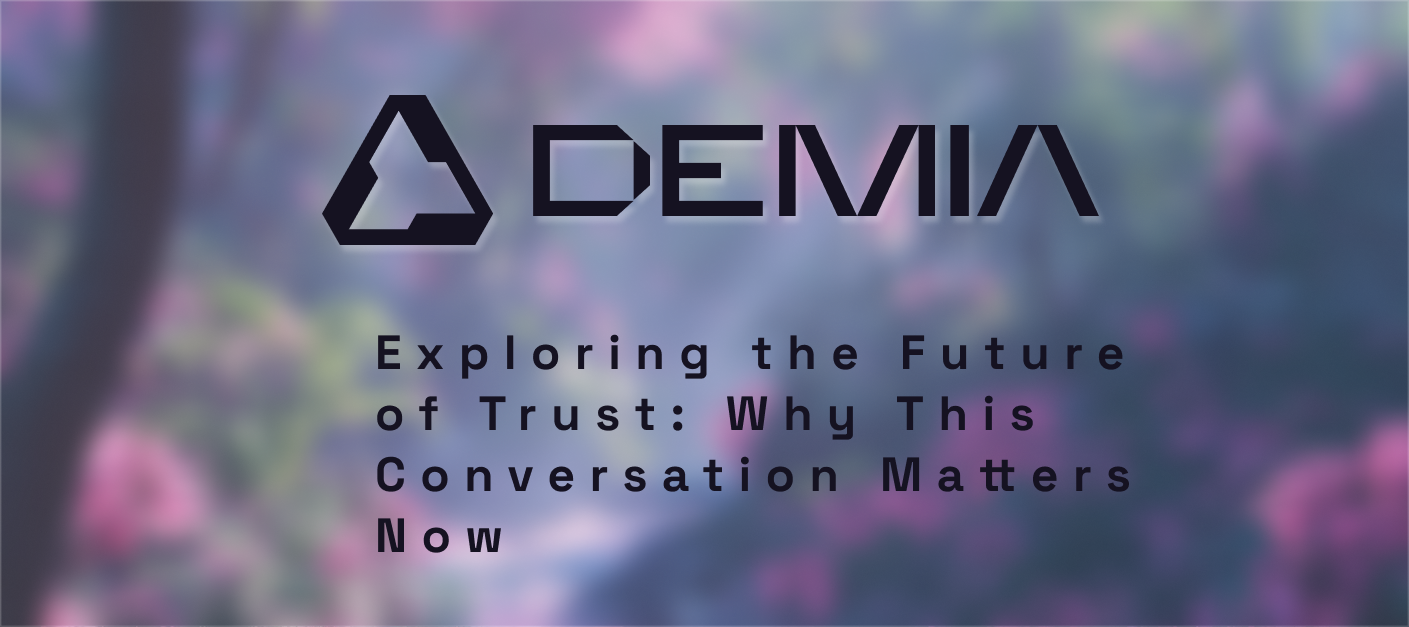
Trust is no longer a soft concept. In an age where data is abundant but credibility is scarce, and systems are increasingly automated yet fragile, trust has become both a foundation and a currency. That’s why we created The Future of Trust, a podcast produced by Demia, to explore what trust really means in today’s shifting landscapes of climate, technology, governance, and human connection.
Through the podcast, we identify how we can reclaim trust through rigorous systems, cultural practices, and personal leadership. Each episode brings in voices working on the frontlines of change, offering a cross-disciplinary lens into how trust is built, broken, and reimagined.
Here’s what we've uncovered so far.
Episode 1: Trust at the Interface: Marketing in a Post-Privacy World
The series begins with Anthony Day, former Head of Strategy & Marketing at Midnight and now Marketing Director at VeChain, who explores how brand identity, UX, and technology all contribute to, or erode, trust. Drawing from his time across IBM, Parity Technologies, and Midnight, Anthony breaks down how we’ve normalized oversharing personal data and why privacy-first infrastructure isn’t just a technical choice, but a trust-enabling one.
He challenges marketers and technologists alike to rethink not only how they use data, but how they design for consent, control, and credibility. When systems become "trustless" by design, where verification replaces reliance, do we finally liberate trust to become a human value again, not just a transactional one?
Episode 2: The Architecture of Sustainability: Risk, Policy, and Real Transparency
From the realm of digital infrastructure, we shift into climate policy and finance with David Carlin, former Head of Risk at UNEP FI, the United Nations Environment Programme Finance Initiative. In his conversation, David unpacks how trust sits at the heart of sustainability, not just in reporting frameworks or ESG narratives, but in the capacity of institutions to make long-term commitments amidst short-term chaos.
As both a practitioner and teacher, David reminds us that sustainability is ultimately a change management challenge. In this context, trust is the lever that allows stakeholders, governments, and financial systems to align despite complexity. Trust allows us to plan beyond a news cycle, whether through data, policy, or relationships.
Episode 3: System Change Requires Cultural Trust
Sheri Hinish, Global Sustainability and Technology Leader at EY, aka The Supply Chain Queen, brings a different view of systems. Rather than focusing only on regulatory coherence or risk, she addresses how culture and ecosystems shape our ability to trust, and thus to transform.
For Sheri, trust isn’t only what sits between people; it’s what sits underneath entire systems. From circular economy models to collaborative tech platforms, she speaks to the kind of trust that must be architected into transformation itself, a trust that is slow to build, easy to lose, and increasingly essential in an age of greenwashing and performance-based ESG.
Episode 4: When Trust Becomes Personal: Leadership, Risk, and Showing Up
This episode hit me very differently, as it addressed many personal concepts I took to heart on how to embed trust in every action I take. Jim Massey, author of Trust in Action and a former global sustainability executive with organizations like One Tree Planted, Zai Lab, Vizibl, and AstraZeneca, takes the conversation inward. He speaks candidly about his own leadership journey, from operating in high-stakes corporate settings to redefining work-life balance as life’s work.
Jim invites listeners to consider that trust starts with self-trust, the courage to act, the ability to show up as your full self, and the willingness to embrace risk not as a threat, but as the path. "Risk isn’t what’s in the way," he says, "it is the way." In a time when trust in institutions is declining, this episode grounds us in what can’t be outsourced: our own integrity.
Episode 5: Listening as Resistance, Listening as Design
In perhaps the most human-centered episode of the series, we sit down with Marisa Zalabak, an AI ethicist and longtime educator in restorative circles. This conversation departs from the systemic and the strategic, and instead journeys through indigenous listening practices, the psychology of presence, and the need to reclaim our internal disciplines of awareness.
Marisa makes the case that listening is not just a method, it’s a radical act in a world built for speed, distraction, and separation. She speaks of trust not as a concept, but as a practice: one that begins by listening inward, then holding space for others. As AI becomes more "empathetic" by design, she warns, we must not forget how real human empathy is built, not programmed.
The Future of Trust is building a scaffolding for the deeper questions we all need to be asking:
• Can systems be trusted if people don’t trust each other?
• Can transparency coexist with meaningful privacy?
• Can we trust ourselves enough to act before certainty arrives?
In every episode, the voices we bring on offer different answers, but a shared truth remains: trust is built, not assumed. And in this new era, it’s the ones who can build trust, through systems, stories, authenticity and sincerity, who will shape what comes next. We’re just getting started.